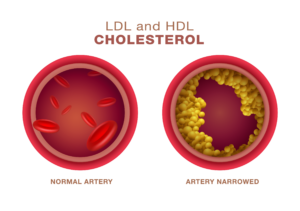Heart Health Awareness: Understanding Cardiovascular Diseases, Prevention and Treatment Options
February: Heart Health Awareness Month
February is not just a month marked by love and romance, thanks to Valentine’s Day; it’s also Heart Health Awareness Month. This observance serves as a vital reminder of the importance of maintaining cardiovascular health. According to the World Health Organization, cardiovascular diseases (CVDs) are the leading cause of death globally, accounting for an estimated 17.9 million lives each year. The objective of Heart Health Awareness Month is to educate individuals about heart disease, its risk factors, prevention strategies, and the latest advancements in treatments.
Understanding ASCVD, Heart Attacks, and Strokes
Atherosclerotic cardiovascular disease (ASCVD) is a condition where the arteries become narrowed and hardened due to a build-up of plaque. This condition can lead to serious heart-related issues, including heart attacks and strokes. Heart attacks, or myocardial infarctions, occur when the blood flow to a part of the heart is blocked, usually by a blood clot. Without oxygen-rich blood, the affected heart muscle begins to die. Strokes, on the other hand, occur when the blood supply to a part of the brain is interrupted or reduced, preventing brain tissue from getting oxygen and nutrients. Both conditions can have severe, life-altering consequences or even be fatal.
The Role of LDL Cholesterol in Heart Health
Low-density lipoprotein (LDL) cholesterol is often referred to as “bad” cholesterol because high levels can lead to plaque build-up in arteries, increasing the risk of ASCVD, heart attacks, and strokes. Lowering LDL cholesterol is a crucial strategy in preventing these conditions and promoting heart health.
Traditional Treatments: Statins
Statins are a class of drugs commonly prescribed to lower cholesterol levels in the blood. They work by inhibiting an enzyme involved in cholesterol production in the liver. Statins have been effective in reducing LDL cholesterol and lowering the risk of heart attacks and strokes. However, they are not without their drawbacks. Some patients experience side effects such as muscle pain, liver damage, and increased blood sugar levels. Additionally, a subset of patients is statin-intolerant, meaning they cannot tolerate the medication due to side effects or lack of efficacy.
Leqvio: A New Hope in Cholesterol Management
Enter Leqvio (inclisiran), a revolutionary medication that offers a promising alternative to statins for lowering LDL cholesterol in some patients. Approved by the FDA, Leqvio is a small interfering RNA therapy that targets a specific gene involved in cholesterol production. Administered as a subcutaneous injection every six months, Leqvio works by silencing the PCSK9 gene, leading to increased clearance of LDL cholesterol from the blood.
Why Leqvio Is a Better Alternative
- Efficacy & Effectiveness: Clinical trials have demonstrated that Leqvio can lower LDL cholesterol by about 50% in the first 6 months, making it highly effective for some patients with stubbornly high LDL levels or who are statin-intolerant.
- Safety Profile: Leqvio has demonstrated a favorable safety profile with fewer side effects compared to statins. The most common side effects reported are mild injection site reactions. This makes Leqvio a viable option for some patients who cannot tolerate statins.
- Convenience: The bi-annual administration of Leqvio offers a convenient alternative to daily statin pills. This can improve medication adherence and ultimately lead to better health outcomes.
The Impact of Leqvio on Heart Health
By effectively lowering LDL cholesterol, Leqvio can play a crucial role in preventing ASCVD, heart attacks, and strokes. For patients with a history of cardiovascular events or those at high risk, Leqvio may offer a new avenue for managing cholesterol levels and reducing the likelihood of future events.
Heart Health Awareness: Prevention is Key
While advancements in treatments like Leqvio provides new hope, prevention remains a cornerstone of heart health. During Heart Health Awareness Month, it’s important to emphasize the following preventive measures:

- Healthy Diet: Consuming a diet rich in fruits, vegetables, whole grains, lean proteins, and healthy fats can help maintain healthy cholesterol levels and overall heart health.
- Regular Exercise: Engaging in regular physical activity, such as brisk walking, swimming, or cycling, can strengthen the heart and improve cardiovascular fitness.
- Avoiding Tobacco: Smoking cessation is critical as tobacco use is a major risk factor for heart disease.
- Managing Stress: Chronic stress can negatively impact heart health. Techniques such as mindfulness, meditation, and adequate sleep can help manage stress levels.
- Regular Check-Ups: Routine visits to a healthcare provider can help monitor cholesterol levels, blood pressure, and other risk factors, allowing for early intervention when necessary.
Conclusion
Heart Health Awareness Month is an opportunity to reflect on the importance of cardiovascular health and to take proactive steps toward maintaining it. Innovations in treatments, like Leqvio, offer new hope for patients struggling with high LDL cholesterol and provide a promising alternative to traditional statin therapy. By combining these advancements with preventive measures, we can work towards a future with healthier hearts and fewer cardiovascular events.











